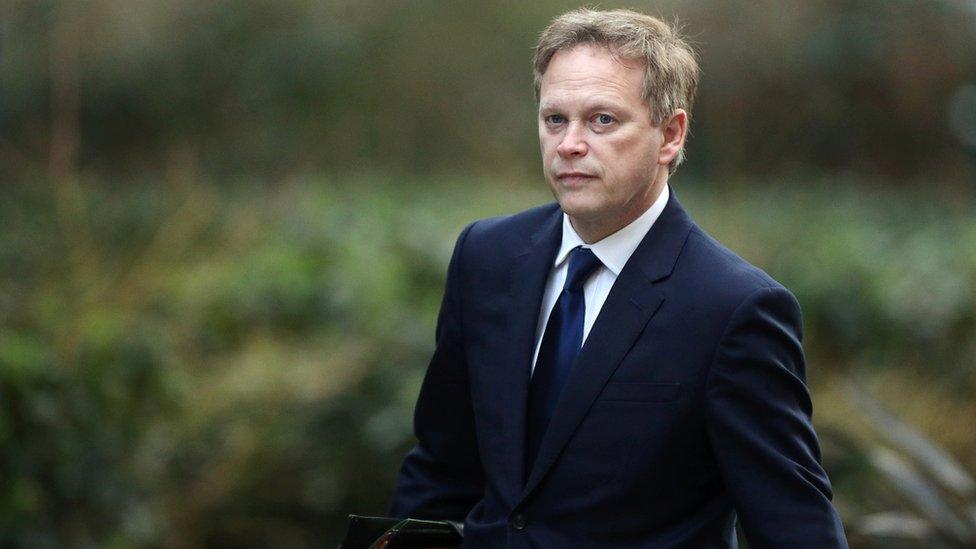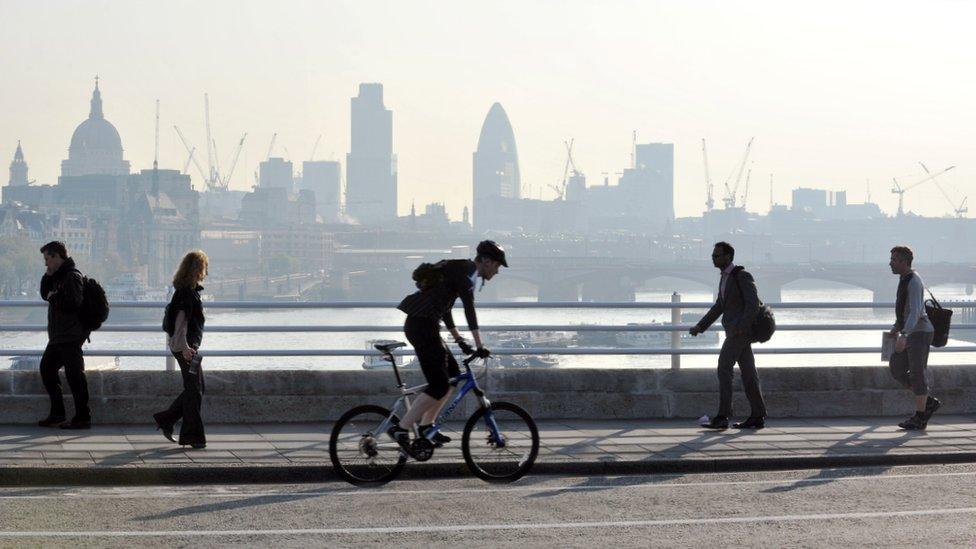Government to urge us all to walk and cycle more
- Published

Mr Shapps is expected to say that the lockdown is an "opportunity" to change the way we get to work
We need to protect the public transport network as lockdown is lifted, the UK's transport secretary is expected to say at a press conference on Saturday.
The BBC understands Grant Shapps will encourage the public to continue to work from home if they can.
Those who need to travel to work will be urged to consider more active ways to travel like walking and cycling.
Extra funding is likely to be announced for English local authorities to help alter road networks to facilitate this.
The intention is to take pressure off roads and public transport networks.
This is a devolved issue and in Wales the assembly is suggesting a number of new policies including road and lane closures with filters for cyclists. Scotland announced funding for "active travel infrastructure" in April. , external No specific measures have been announced yet in Northern Ireland although the infrastructure minister is expected to appoint a cycling and walking champion.
It is believed that Mr Shapps will talk about using the unique "opportunity" of the lockdown restrictions to change the way we get to work.
Big challenges
How we will travel while maintaining social distancing is one of the biggest challenges the government faces as it seeks to start to lift the lockdown.
Maintaining the two-metre rule will mean buses, trains and tubes will be able to carry far fewer passengers.
Their capacity could be reduced by as much as 90%, according to some estimates.
There have been fewer buses and trains scheduled during the lockdown, so it will take time to restore normal services.
Many commuters will also be concerned about the safety of crowded buses and trains but, if more people try to commute into work in their cars, the roads are likely to become choked with traffic.

The solution, Grant Shapps is expected to say, is for us all to walk and cycle more.
The BBC understands that the proposal to increase what the government is calling "active travel" will be presented as an opportunity for us all to live "cleaner, greener, healthier lives".
Mr Shapps is likely to announce extra funding for local authorities to pay for alterations to the road network to facilitate this move to more active ways to get around.
He is also expected to announce plans to give local authorities new powers to change the road network and designate extra space for cyclists and pedestrians.
The mayors of London and Manchester - Sadiq Khan and Andy Burnham - announced last week that they were planning to close some roads to cars to create dedicated pedestrian and cycle routes.
BBC transport correspondent Tom Burridge said Mr Shapps was also set to announce that trials of e-scooters will be fast-tracked to any area of Britain that wanted to attempt one.
Currently, trials are limited to a small number of areas.
The transport secretary's announcement comes as a coalition of nine environmental and transport pressure groups have written to the government to demand a big increase in spending on walking and cycling.
Their letter calls for a fundamental redesign of the transport network to improve public health, clean the air and protect the climate.
It also points out that the lockdown has led to a dramatic improvement in air quality in Britain's towns and cities.
Some of Britain's largest cities have seen a 60% reduction in levels of nitrogen dioxide, a harmful pollutant gas associated with traffic.
The letter's signatories include Greenpeace, the countryside charity the CPRE (Campaign to Protect Rural England), and seven other environment and transport organisations.
They argue that making a permanent switch towards more active travel would help protect these improvements in the local environment.


Toxic air is responsible for thousands of premature deaths in the UK every year, the letter says.
"It would be completely absurd if, after the unprecedented efforts and sacrifices made to save thousands of lives from Covid-19, we allowed thousands more to be cut short by the devastating impacts of toxic pollution," it reads.
The organisations recommend that local authorities widen pavements and increase cycle lanes, as well as giving priority to people who walk and cycle.
They call for the speed limit to be cut to 20 mph in all built-up areas except where segregated cycle lanes are in place. They also demand £6bn in additional funding over the next five years to invest in new transport infrastructure.
Follow Justin on Twitter., external